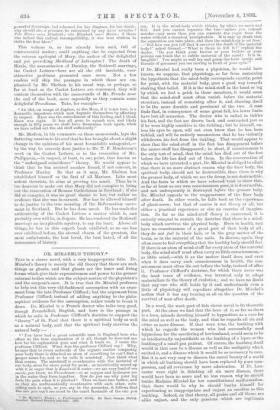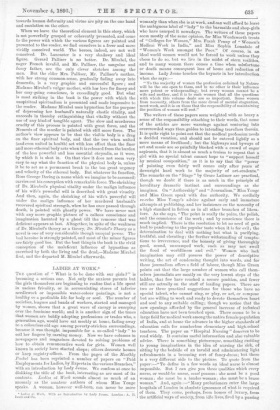DR. MIRABEL'S THEORY.* THIS is a clever novel, with a
very inappropriate title. Dr. Mirabel's theory is merely the old theory that there are such things as ghosts, and that ghosts are the inner and living forms which give their expressiveness and power to the grosser external bodies which are the subject-matter of the physician's and the surgeon's care. It is true that Dr. Mirabel professes to help out this very old-fashioned assumption with an argu- ment from the late Professor Clifford ; but the argument from Professor Clifford, instead of adding anything to the philo- sophical evidence for the assumption, rather tends to break it down. Dr. Mirabel is a French doctor who talks very good, though Frenchified, English, and here is the passage in which he calls in Professor Clifford's doctrine to support the " theory " of St. Paul that there is a spiritual body as well as a natural body, and that the spiritual body survives the natural body:— "'You have had a great scientific man in England hero who offers us the true explanation of it all, though he does not see how far his explanation goes and what it leads to. I mean the professor Clifford. What does the professor Clifford say P Why, he says that to every molecule of the organic matter composing your body there is attached an atom of something he can't find a proper name for, and so he calls it mindstuff. Just think what that means. The mindstuff is co-extensive with the material of our body, atom for atom, point for point ; as inextricably mixed up with it as sugar that is dissolved in water--we are very fond of eau sucrde, you know, we Frenchmen—or as oxygen and hydrogen are in the water they form together. Now do you see why your leg feels the pain when it is pricked Thus we have two bodies, and as they are mathematically co-extensive with each other, coin- ciding each to each, as you say in the geometry, it follows that the one you can't see must be the exact facsimile of the one you • Dr. Mirabors Them, a Pnychological Study. By Boss George Meng. London ; Riohard Bentley and Son. 1893. can. It is the mind-body which thinks, by which we move and feel. And you cannot separate the two—unless you commit murder—any more than you can separate the sugar from the water without a chemical precipitation. It is only by death that the separation can take place, and then the mind-body is set free.'
But how can you tell that it survives the death of the material body P' asked Gerard.—' What is there to kill it ?' replied the doctor. Do you think your knives or your bullets or your poisons can touch the so subtle material of the mind? It is in- tangible ! You might as well try and grasp the faint specks and threads of gossamer you see moving in front of your eyes."'
If Dr. Mirabel had really been a physician, he would have known, we suppose, that physiology, so far from sustaining the hypothesis that the mind-body corresponds exactly, point for point, with the material body, goes a good way towards shaking that belief. If it is the mind-stuff in the hand or leg by which we feel a prick in those members, it would seem that the mind-stuff must often vanish before the material structure, instead of remaining after it, and showing itself to be the more durable and persistent of the two. A man finds that, in consequence of some great fall, his lower limbs have lost all sensation. The doctor who is called in tickles his feet, and the feet are drawn back and contracted just as if he were highly sensitive to the tickling ; but he himself, un- less his eyes be open, will not even know that he has been tickled, and will be entirely unconscious that he has violently withdrawn his feet from the tickling. That would appear to show that the mind-stuff in the feet has disappeared before the motor-stuff has disappeared ; in short, if consciousness is the only test of mind, that the mind has died out of the feet before the life has died out of them. In the conversation of which we have extracted a part, Dr. Mirabel is obliged to admit that there is no more abstract reason why the finer body, the spiritual body, should not be destructible, than there is why the grosser body, of which we see the decay, is not destructible. And the facts to which we have referred' tend to show that, so far at least as our own consciousness goes, it is destructible, and not unfrequently is destroyed before the grosser body.
Dr. Mirabel appeals to the reappearance of the finer body after death. In other words, he falls back on the experience of ghost-seers ; but that of course is not theory at all, but either a practical experience or else an exercise of imagina- tion. So far as the mind-stuff theory is concerned, it is entirely unequal to sustain the doctrine that there is a mind- body which survives the physical body. Even in. health, men have no consciousness of a great part of their body at all ; they do not feel in their hair, or in the grey matter of the brain, or in the material of the nails. In disease, again, they often cease to feel everything that the healthy body should feel. If there is an atom of mind-stuff for every atom of the material body, the mind-stuff must often carry as little consciousness,— as little mind,—with it as the matter itself does, and even when it does carry such consciousness in health, the con- sciousness must often die out before the body, instead of after it. Professor Clifford's doctrine, for which there never was the least trace of evidence, was invented only to adapt materialism to the theory of evolution; and we have no doubt that any one who still holds by it and understands even a little of physiology will repudiate altogether Dr. Mirabel's notion that it has any bearing at all on the question of the survival of man after death.
In a word, the weak part of this clever novel is its theoretic part. At the close we find that the hero of it, so far as there is a hero, intends devoting himself to hypnotism as a cure for the mind as well as the body, and that he regards all sin and crime as mere disease. If that were true, the loathing with which he regards the woman who had successfully used hypnotism for the murdering of her husband, would seem to be as intellectually unjustifiable as the loathing of a leper, or the loathing of a small-pox patient. Of course, the loathing itself would in that case be a disease as well as the malignity which excited it, and a disease which it would be as necessary to cure. But it is not very easy to discern the moral beauty of a world in which all loathing should have been replaced by pure com- passion, and all reverence by mere admiration. If Dr. Lan- caster were right in , thinking all sin mere disease, there would have been no more and no less reason why he should loathe Madame Mirabel for her constitutional malformation, than there would be why he should loathe himself for experiencing so inappropriate and unjust an emotion as this loathing. Indeed, on that theory, all praise and all blame are alike unjust, and the only passions which are legitimate towards human deformity and virtue are pity on the one hand and emulation on the other.
When we leave the theoretical element in this story, which is not powerfully grasped or coherently presented, and come to the power with which the various figures are painted and presented to the reader, we find ourselves in a freer and more vividly conceived world. The heroes, indeed, are not well conceived. Dr. Lancaster is a very shadowy and ideal figure. Gerard Palliser is no better. Dr. Mirabel, the eager French invalid, and Mr. Palliser, the sanguine and fussy father, are the only clever sketches among the men. But the elder Mrs. Palliser, Mr. Palliser's mother, with her strong common-sense, gradually fading away into dementia, is a very graphic and successful figure ; and Madame Mirabel's vulgar mother, with her love for finery and her easy-going conscience, is exceedingly good. But what is most striking in the book is the power with which the unspiritual spiritualism is presented and made impressive to the reader. Madame Mirabel uses hypnotism for the purpose of depressing her husband's naturally elastic vitality, and succeeds in thereby extinguishing that vitality without the use of any kind of tangible agent. The slow and murderous cruelty of this process is painted with great force, and the Nemesis of the murder is painted with still more force. The author's view appears to be that the visible body is a drag on the finer spiritual body, and that the two when united (and even united in health) act with less effect than the finer and more ethereal body acts when it is released from the burden of the less powerful and less essential chrysalis, as it were, by which it is shut in. On that view it does not seem very easy to say what the function of the physical body is, unless it be to act as a permanent break to the too great urgency and velocity of the ethereal body. But whatever its function, Ross George Dering (a name which we imagine to be assumed) carries out his conception with remarkable force. The shrinking of Dr. Mirabel's physical vitality under the malign influence of his wife's powerful will is described with great vivacity. And then, again, the shrinking of his wife's powerful will under the malign influence of her murdered husband's recovered spiritual strength, when he has once passed through death, is painted with ghastly power. We have never met with any more graphic picture of a callous conscience and imagination haunted by a ghost till the remorse that was deficient appears at last. Altogether, in spite of the weakness of Dr. Mirabel's theory as a theory, Dr. Mirabel's Theory as a novel is one of very considerable though unequal power. The bad heroine is strongly painted, and most of the minor figures are fairly good 'too. But the best thing in the book is the vivid conception of the maleficent influence of hypnotism as exercised by both the living and the dead,—Madame Mirabel first, and the departed M. Mirabel afterwards.





















































 Previous page
Previous page